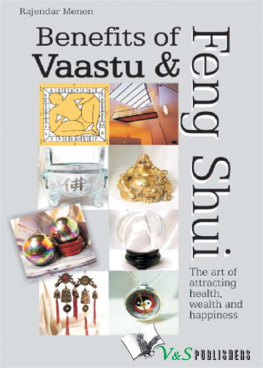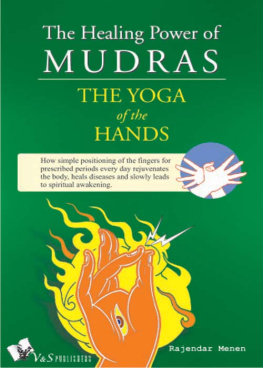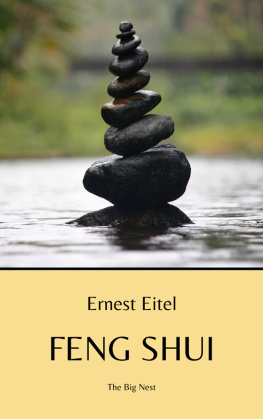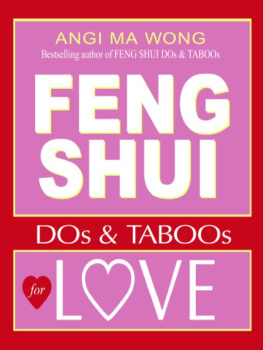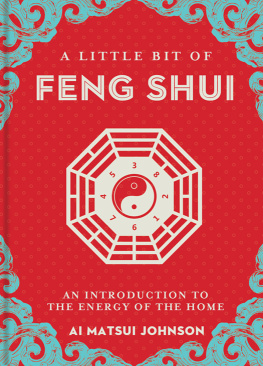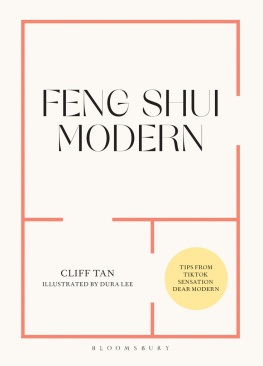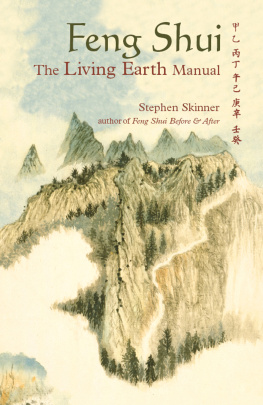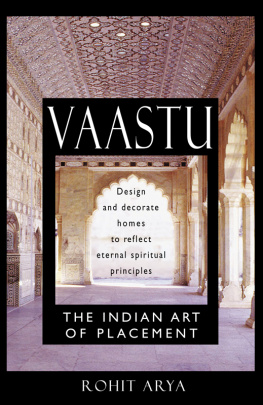Rajendar Menen - Benefits of Vaastu and Feng Shui
Here you can read online Rajendar Menen - Benefits of Vaastu and Feng Shui full text of the book (entire story) in english for free. Download pdf and epub, get meaning, cover and reviews about this ebook. year: 2008, publisher: Pustak Mahal, genre: Romance novel. Description of the work, (preface) as well as reviews are available. Best literature library LitArk.com created for fans of good reading and offers a wide selection of genres:
Romance novel
Science fiction
Adventure
Detective
Science
History
Home and family
Prose
Art
Politics
Computer
Non-fiction
Religion
Business
Children
Humor
Choose a favorite category and find really read worthwhile books. Enjoy immersion in the world of imagination, feel the emotions of the characters or learn something new for yourself, make an fascinating discovery.
- Book:Benefits of Vaastu and Feng Shui
- Author:
- Publisher:Pustak Mahal
- Genre:
- Year:2008
- Rating:3 / 5
- Favourites:Add to favourites
- Your mark:
- 60
- 1
- 2
- 3
- 4
- 5
Benefits of Vaastu and Feng Shui: summary, description and annotation
We offer to read an annotation, description, summary or preface (depends on what the author of the book "Benefits of Vaastu and Feng Shui" wrote himself). If you haven't found the necessary information about the book — write in the comments, we will try to find it.
Benefits of Vaastu and Feng Shui — read online for free the complete book (whole text) full work
Below is the text of the book, divided by pages. System saving the place of the last page read, allows you to conveniently read the book "Benefits of Vaastu and Feng Shui" online for free, without having to search again every time where you left off. Put a bookmark, and you can go to the page where you finished reading at any time.
Font size:
Interval:
Bookmark:

Benefits of
Vaastu
&
Peng Shui

Rajendar Menen

Published by:

F-2/16, Ansari road, Daryaganj, New Delhi-110002 23240026, 23240027 Fax: 011-23240028
23240026, 23240027 Fax: 011-23240028
Email:
Branch : Hyderabad
5-1-707/1, Brij Bhawan (Beside Central Bank of India Lane)
Bank Street, Koti Hyderabad - 500 095 040-24737290
040-24737290
E-mail:

Copyright: Author
ISBN 978-93-813845-3-4
Edition: April 2011
The Copyright of this book, as well as all matter contained herein (including illustrations) rests with the Publishers. No person shall copy the name of the book, its title design, matter and illustrations in any form and in any language, totally or partially or in any distorted form. Anybody doing so shall face legal action and will be responsible for damages.
D EDICATION
MAY GOOD VAASTU AND PENG SHUI GUIDE
ALL THE GODDESSES WHO BROKE BREAD
WITH ME ALONG THE WAY.
T here are billions of words on Vaastu and Feng Shui. There are also several score practitioners and theorists who have taken great pains in their interpretation of these sciences. We would like to specially acknowledge the contributions of Wendy Hobson and Juliet Pegrum, among others. They have taken enormous effort to explain the complexities in everyday language.
V aastu and Feng Shui are household names today. Suddenly, almost out of nowhere, like an ancient prophecy come alive, they have emerged out of the closet and taken the world by storm. Both have ancient origins. Both have been conceived in the womb of two of the most ancient civilisations in the world; Vaastu is Indian and Feng Shui is Chinese in origin. And both have many similarities and one end: to make life happier, healthier and more prosperous for those who follow the principles.
There are hundreds of thousands of books, websites, shops and outlets all over the world selling Feng Shui and Vaastu information and merchandise. Practitioners have become well-known newspaper columnists and merchandise has travelled to homes across the globe.
The twenty-first century has seen many new developments. The world has now woken up to the immense possibilities of maximising the human potential. Man has realised that with the right diet, the right exercise, the right medication and the right environment, he can give his life a longer and more fruitful lease. Vaastu and Feng Shui fall squarely into this paradigm of evolution, growth and betterment.
Writing a book on Vaastu and Feng Shui is not easy. There are several complexities that need to be unravelled and a lot depends on the interpretation of the practitioner. However, a strong thread of common sense runs through both, and that helps. While there are millions of words on the subject, Wendy Hobson and Juliet Pegrum were illuminating in their interpretation of the subject.
We hope this book helps you understand the science better as we have dealt a lot on the origins. We also hope that it stirs your curiosity to know more about the subject and make effective changes in your everyday life. The idea simply is to help you fulfil your potential in every way and lead a happier, healthier and more prosperous life.

Let the everlasting air and light make comfortable the house that is built up with skill and knowledge and measured and erected by learned architects.
Atharva Veda
Among the oldest literary works known to man written around 2500 BC, the Vedas mention gods directly related to Vaastu Vidya (knowledge of Vaastu). The Hindu triad of Brahma, Vishnu and Shiva and their wives are important to Vaastu. Lakshmi, wife of Vishnu, is the Goddess of Fortune and she attracts wealth. Saraswati, wife of Brahma, is the Goddess of Science and Wisdom. Of course, the most popular Indian deity is Lord Ganesh, the son of Shiva and Parvati.

In the Hindu pantheon of gods and goddesses, Shiva is the creator and destroyer. He is depicted with a blue throat and his sacred animal is Nandi, the bull. He has four arms, usually holding a bow, a club, a drum and a noose. His symbol is the Ungarn or phallus, which emerges from the female yoni.
Vishnu has ten major incarnations: Matsya, Kurma, Varcha, Narasimha, Vamana, Parsurama, Rama, Krishna, Buddha and Kalki. He is depicted with his consort, Lakshmi, resting on a lotus. His sacred animal is Garuda, which is half man, half bird.
Brahma is the symbol of creation connected with the origin of the universe. He has four faces of which only three are visible. They represent the four Vedas. His four hands denote the four directions and hold a rosary, water pot, book, sceptre, spoon, bow or lotus. The swan is his vehicle.
Ganesh, perhaps the most popular Indian god, has an elephants head, four to ten arms, and a round belly. His vehicle is a rat and he holds a rope, an axe, a goad and a dish of sweetmeats. The fourth hand is in the boon-giving position. Lord Ganesh is the destroyer of obstacles and is also known as the God of Wisdom.
Vaastu Vidya is ancient Indian knowledge. The word Vaastu means to dwell and Vidya means science and so, quite literally, Vaastu Vidya is the sacred science related to designing and building houses. Vaastu is rooted in Vedic philosophy and is considered by experts and practitioners to be the distant ancestor of Feng Shui, the Chinese art of geomancy, which we will be elaborating later in this book.
Both Vaastu and Feng Shui have the same goals - to restore the balance between the home and the cosmos bringing health, wealth and happiness to those who follow the principles, most of which are based on simple common sense. There may be an esoteric element to the science but it rests a lot on the interpretation of the practitioner one is consulting.
Vaastu believes that the external and the internal are interchangeable. According to Vaastu, the energies that govern the elements, like wind or fire, are similar to those that control the organs of the human body. According to Vaastu, when buildings echo the underlying cosmic principles, they vibrate in harmony with the universe. These vibrations also affect those who are housed in the building and can determine their health, wealth, happiness, progeny and prosperity.
Font size:
Interval:
Bookmark:
Similar books «Benefits of Vaastu and Feng Shui»
Look at similar books to Benefits of Vaastu and Feng Shui. We have selected literature similar in name and meaning in the hope of providing readers with more options to find new, interesting, not yet read works.
Discussion, reviews of the book Benefits of Vaastu and Feng Shui and just readers' own opinions. Leave your comments, write what you think about the work, its meaning or the main characters. Specify what exactly you liked and what you didn't like, and why you think so.

